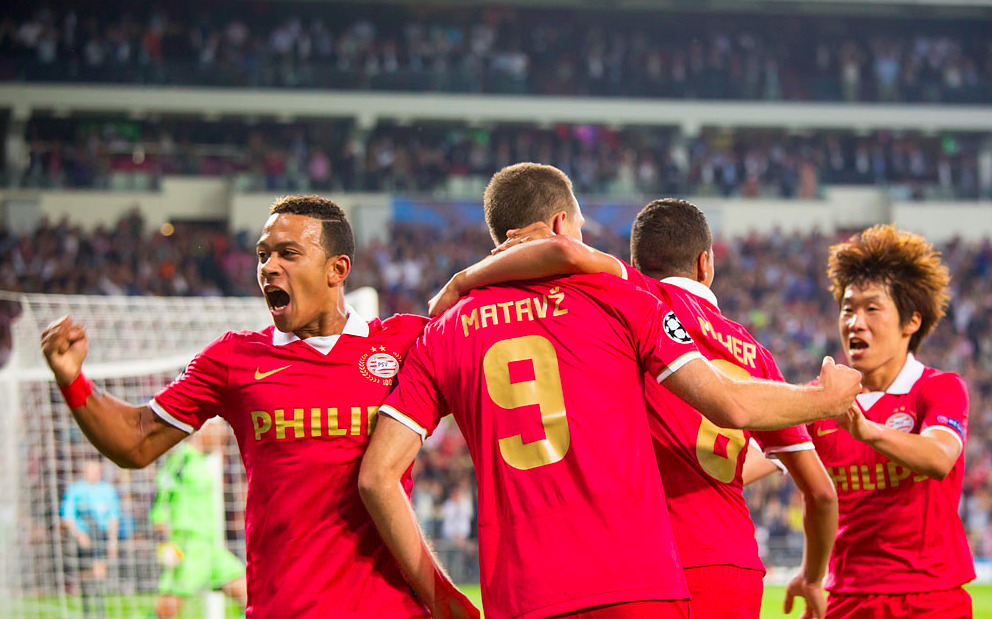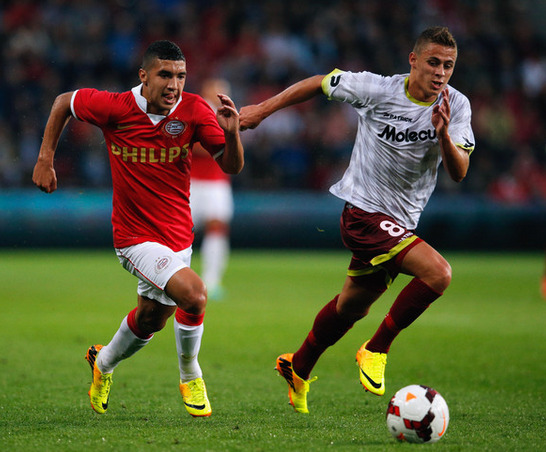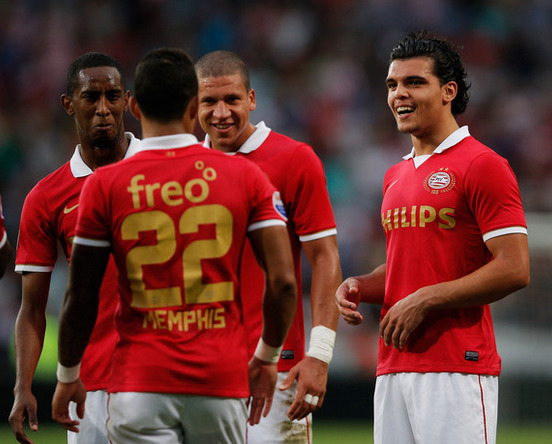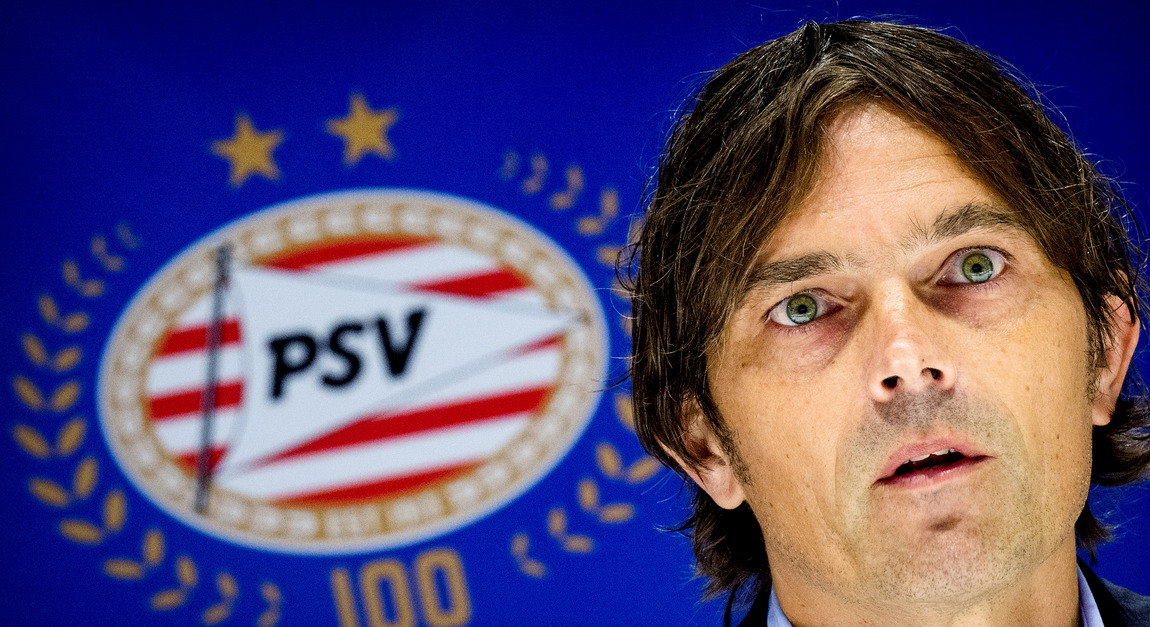Once the midfield master on the field and now the manager, can Cocu start a dynasty at his PSV?
Once the midfield master on the field and now the manager, can Cocu start a dynasty at his PSV?

Once the midfield master on the field and now the manager, can Cocu start a dynasty at his PSV?
The more things change, the more they stay the same. No better example than at PSV Eindhoven; third consecutive season they’ve started with a new manager, yet it hasn’t impacted, they remain a threat going forward as well as nervy at the back. However, the atmosphere is slightly different, a whiff of a nouveau PSV: exuberance replacing pragmatism, catalyst being their new manager Phillip Cocu.
One of the most accomplished midfielders of his generation. Cocu was renowned for his tactical acumen, industrious style, never-say-die attitude and leadership. He was an example to his teammates, who he greatly inspired, and widely respected by his opponents.
It was at his second club Vitesse – joined from AZ in 1990 – where it became clear he was a player destined for great things. It wasn’t long before one of the traditional powers made a move. He would join hometown club PSV, signed by would-be mentor Dick Advocaat, in the summer of 1995. It would be the start of a beautiful relationship.
Despite being raised in Eindhoven he grew up supporting arch-rivals Ajax and Manchester United from afar. His admiration of the Amsterdammers philosophy would in turn shape his own. Cocu was the modern ‘total footballer’. A brilliant all-rounder – capable of playing in numerous positions – Cocu for much of his career was a dynamic box-to-box midfielder, before converting into a controlling midfielder then finally deep-lying creator. Versatility was a blessing not a hindrance. He could, if his manager wanted, even play in defence.
Silent off the field he was a goliath on it. His departure in 1998 to FC Barcelona, where he held the record for the most capped foreigner until Lionel Messi came along, was not a goodbye but more a see you later. He won one championship in his first stint PSV; three followed in his second, including scoring the decisive goal on the final day of the 2006/07 season, which turned out to be his last game for the club.
It came as no surprise once hanging up his boots a career in management was the path he took. As a footballer he was a brilliant tactician and analyst, often carrying out these duties whilst playing, changing things if needs be. He earned that right. Like every manager Cocu has his own vision, greatly influenced by Hiddink as well as Advocaat and Louis van Gaal who he worked under at Barça and Oranje. He’s even been touted as Hiddink’s natural heir.
From the onset he was touted for big things. Barcelona wanted him to manage their B team – some at the club saw him as a credible successor to Pep Guardiola – he would turn them down to remain as Fred Rutten’s right-hand man. Everything changed in spring of 2012.
Rutten, after less than three years, was relieved of his duties. After some hesitation Cocu decided to take up the mantle and for the remainder of this season, manage the club he served with distinction. The inflexibility of Rutten’s system was his downfall. PSV became too predictable; when Plan A backfired, he was like a rabbit caught in the headlights. It happened all too often in his last few months.
They had the league wrapped up, at the backend of 2010/11, but fell on their own sword. Initially in the following season some lessons were learned. The 4-2-3-1 formation, his treasured companion was dumped in favour of a 4-3-3. This still wasn’t enough for his critics.
PSV, like their great rivals in Amsterdam demand a particular style, in line with their traditions. Rutten wasn’t oblivious to their requisite but made the error of drifting away from it. His time spent at Schalke was seen as a turning point, it was there he became dogmatic; focusing solely on winning by any means, there was madness to his method a concept alien to Hiddinkites.
Cocu would guide PSV to their first piece of silverware in four years; a KNVB Beker victory over Heracles, he steadied the ship and came close to a runner-up finish which would have meant chance of Champions League football.
His brief stint in charge saw him display and demonstrate foresight and tactical acumen; in the process radiating the impression and convincing most he could one day follow in his mentor Hiddink’s footsteps, sporting director Marcel Brands was open to a long-term stay, but the club legend felt it was better to continue his education at youth and reserve level.
Brands wasn't despondent for long as a one-year deal with Advocaat was reached, idea behind it being Cocu would take over full-time the following summer, it was a plan greeted with enthusiasm. In what turned out to be a disappointing campaign;Advocaat at least ensured Champions League football for Cocu and his new charges, as well as those who remained.
In what has been a busy summer; PSV said goodbye to ten first team regulars notably Mark van Bommel (retired), Kevin Strootman (Roma), Dries Mertens (Napoli) and Jeremain Lens (Dynamo Kyiv). In their place seven new faces; five under 23, underlining their new approach. “Investment for the future,” as Brands told Eindhovens Dagblad. “We’ve seen how a young talent can suddenly show up at Feyenoord”, he concluded.
Around the time Rutten was dismissed the seeds of this current PSV were being sowed. A new economic reality forced PSV – like every Dutch club – to focus even more on youth and development. With a first team squad getting younger; Cocu, in all intents and purposes, would be the perfect first team manager.
The average age of their starting eleven, so far this season, is 20 years. In a recent outing against NEC the oldest player was captain Georginio Wijnaldum (22). The departure of Strootman meant Cocu needed a leader; someone who he can trust to get his message across, Wijnaldum selection came as a surprise as many observers felt he lacked the traits of an archetypal skipper but to his credit has since grown into it.
Cocu’s first port of call as manager was strengthening the defence, for too long it has been PSV’s soft underbelly, the addition of Jeffrey Bruma (Chelsea), Santiago Arias (Sporting Portugal), Karim Rekik (on loan from Manchester City) as well as promoting Joshua Brenet and Jorrit Hendrix has gone a long way. Bruma and Rekik, in particular, forged a solid central-defensive partnership. Both are on national team manager Van Gaal’s radar.
Adam Maher (AZ) and Florian Jozefzoon (RKC Waalwijk) also joined this summer; the former arguably the most gifted talent in the land, last season’s breakthrough talent Jürgen Locadia is also central to Cocu’s plans.
But it is Zakaria Bakkali, a youth graduate, who has initially stolen the most attention. Bakkali, who joined from Standard Liège in 2008, symbolises this new youthful and fearless PSV. His stature, in such a short space of time, has risen. An impressive debut against Zulte Waregem in the Champions League last month caught the eye of Belgian national team manager Marc Wilmots.
His first goal for PSV in Brussels, against the same opposition, would be followed by a first Belgium call-up for their friendly against France. He would unfortunately sustain a thigh injury during training. This coming after completing an impressive hat-trick against NEC – becoming the youngest to do so in Eredivisie history – despite his manager labelling it a “complete performance” Bakkali’s feet is firmly on the ground. “Football to me is fun,” he said afterwards.
Bakkali, after being voted best player at a youth tournament aged 15, revealed he snubbed Manchester City. “I considered leaving PSV and even visited Manchester City to sign a contract there,” he told Sport/Voetbalmagazine. “But my dad convinced me not to leave and I signed a three-year deal with PSV instead.”
“Mark van Bommel played a big role in my development, just like Dries Mertens,” he continued. “I have to learn to keep things simple. I can dribble one or two opponents, but they will foul me after that. Van Bommel in particular showed me that in training. He never hurt me, though. People already compare me to Romario because of my style of play, but I still have a long way to go.”
Cocu has moved from a 4-3-2-1, prevalent in his brief stint in charge, to a more orthodox 4-3-3. His tactical approach, still remains intact, influenced by the Dutch school of ‘circulation football’ (one-touch combination football), is laced with skilful midfielders (Stijn Schaars, signed from Sporting Portugal, Maher and Wijnaldum), and wingers/wide-men (Memphis Depay, Bakkali, Jozefzoon, Park Ji-Sung and Luciano Narsingh) – is geared to relentlessly creating scoring opportunities.
Aside from a difficult first half against Go Ahead Eagles at home, which they eventually won 3-0, and second forty-five away to ADO Den Haag, lead 3-0 before conceding twice, one before half-time; no problem domestically, but Cocu retaining same instincts from his playing days remains cautious. His side is still a work in progress; a team laced with youth, will come a cropper from time to time.
The Champions League play-off against AC Milan presented a “wonderful challenge,” in the words of Cocu. “One that will allow us to see how we measure up to them,” he told reporters. They passed the first examination with flying colours; the teamwork and combinatievoetbal that has so far characterised Cocu’s second reign shone, the only disappointment was conceding a (sloppy) away goal.
“I really believe in this dominant way of playing,” Cocu began. “We displayed it against a side of Milan’s quality, I told my players 'I’m proud’, we have something to fight for next week at San Siro.” The return leg promises to be as enticing. “It will be a difficult task for sure,” Cocu added. “If you don’t believe in your chances, you might as well stay at home.” Confidence in his own ability is something Cocu never lacked. The same applies towards his players.
A few days later they nearly suffered their first loss; at Heracles, a team Cocu described as “fun to watch”. Park Ji-Sung, in his second spell at the club, salvaged a point late on. A trick he picked up at Old Trafford. When they do finally lose, important to remember, it’s all part of the learning process.
The return of the South Korean is more than just strengthening the squad; the knowledge he brings – to what is a youthful squad – is gold according to his former teammate. “Park is a player with a lot of experience after all those years at Manchester United,” Cocu told Algemeen Dagblad. “The guys who now play for us up front are very talented, but they can also gain from someone who has already played at the top level for a long time.”
PSV today is a stark contrast to the final days of Rutten’s regime. Ernest Faber, assistant to Cocu, described the situation then as a small virus infiltrating the club. Cocu has reduced the fever. However this still remains a different PSV from the first years of the new millennium. They were, less than a decade ago, the dominant unilateral power. It’s that stature Cocu aspires towards.











